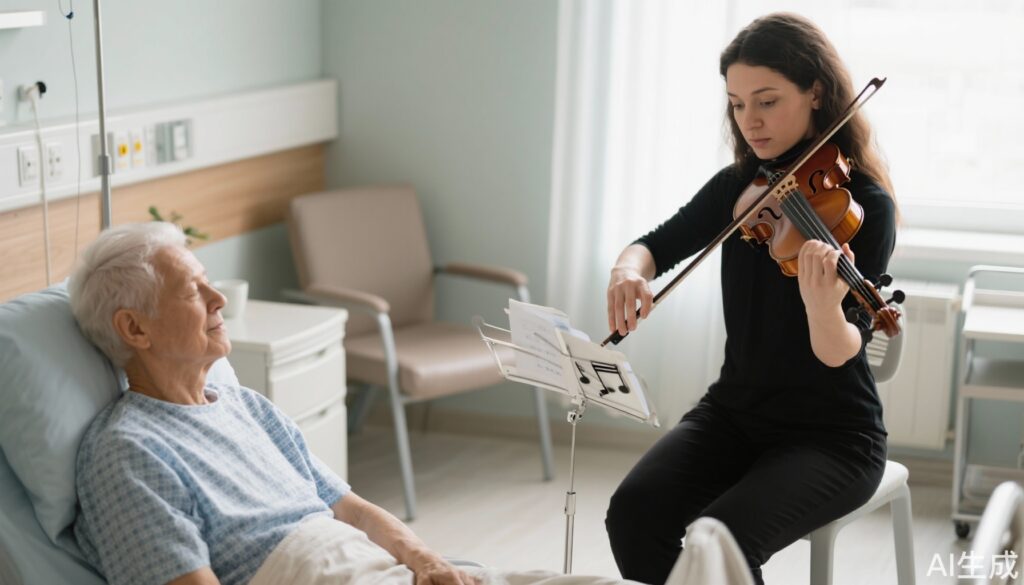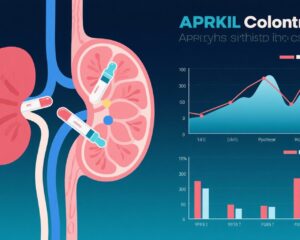Highlight
- Live music therapy delivered by trained music therapists induces significant short-term pain relief in advanced cancer patients.
- The MSPD pilot study observed marked reductions in fatigue, anxiety, and improved well-being alongside pain relief.
- High patient satisfaction and interest for continued sessions suggests feasibility and acceptability in palliative care.
- Meta-analytic evidence corroborates the efficacy of music therapy in reducing anxiety, depression, fatigue, and improving quality of life in adult oncology patients.
Study Background and Disease Burden
Pain is a prevalent and debilitating symptom for patients with advanced cancer, often stemming from tumor burden and side effects of treatments. Conventional analgesics including opioids remain the mainstay but have limitations due to side effects and incomplete efficacy. Hence, complementary interventions like music therapy have gained interest as adjuncts to improve pain management and patient well-being.
Music therapy, defined as clinical use of music interventions by trained therapists, aims to modulate psychological and physiological responses to pain and distress. Prior research indicates potential benefits in reducing anxiety, depression, and pain; however, protocol standardization and real-time patient-tailored delivery are challenges. This prompted the MSPD pilot study to evaluate a structured live-music therapy protocol administered by trained therapists to induce relaxation and pain relief in patients with advanced cancer.
Study Design
The MSPD study was a prospective, exploratory pilot trial (NCT05315427) enrolling 40 patients with advanced cancer experiencing baseline pain ≥3/10 on a numerical rating scale. A single live music intervention was delivered by a trained music therapist aiming to induce deep relaxation. Pain intensity was measured immediately before and after the session while considering pre-session analgesic intake.
Secondary endpoints included assessment of fatigue, anxiety, overall well-being, patient-reported satisfaction, and willingness for additional sessions. The open-label design permitted individualized session tailoring by the therapist based on patient responses.
Key Findings
Pain intensity decreased significantly from a mean of 4.9 to 3.5 (P < 0.0001), irrespective of concurrent analgesic use. Fatigue reduced from 6.2 to 4.3, anxiety from 2.7 to 1.0, and well-being scores improved from 3.3 to 5.2 post-intervention, all with high statistical significance (P < 0.0001). The mean patient satisfaction score was 8.9/10, and 95% of participants expressed willingness to receive further sessions.
These acute effects demonstrate the powerful capacity of live music therapy to induce rapid symptom alleviation through relaxation mechanisms.
Complementing these results, an updated Cochrane meta-analysis incorporating 81 trials with 5576 oncology patients found consistent evidence supporting music therapy's benefits over standard care. Adult cancer patients experienced large reductions in anxiety (mean decrease ~7.7 units on the Spielberger State Anxiety Inventory) and moderate decreases in pain (standardized mean difference [SMD] -0.67) and fatigue (SMD -0.28). Depression also showed moderate improvement (SMD -0.41), though mood alterations were not statistically supported. Quality of life effects were variable but potentially positive.
Music therapy interventions delivered by qualified music therapists showed more consistent benefit compared to music medicine approaches (passive music listening). Pediatric data remain limited and inconclusive.
Expert Commentary
The MSPD pilot confirms the clinical potential of live music therapy as an adjunctive intervention in advanced cancer pain management, addressing an unmet need for non-pharmacologic modalities with minimal adverse effects. Real-time, tailored sessions likely enhance efficacy by matching patient preferences and relaxation depth.
Limitations include the small sample size, short follow-up, and open-label design. Randomized controlled trials with larger cohorts and repeated sessions are warranted to elucidate long-term outcomes and mechanistic pathways, such as modulation of neuroendocrine and autonomic nervous systems.
Clinicians should consider integrating live music therapy as a complementary option within multidisciplinary palliative care, acknowledging patient enthusiasm and the favorable safety profile.
Conclusion
The MSPD pilot study supports live music therapy as a feasible, well-received intervention that provides short-term relief of pain, fatigue, and anxiety in patients with advanced cancer. Meta-analytic data reinforce these benefits, highlighting music therapy’s role in alleviating multiple distressing symptoms and improving overall quality of life. Future research should focus on verifying durability of effects, exploring repeated session protocols, and expanding pediatric oncology evidence. Incorporation of trained music therapists into oncology care teams may enhance holistic symptom management and patient-centered care.
References
Menteaux A, Thomaso M, Jarlier M, Salasc F, Labbaci E, Laigre M, Gallay C. A Live-Music Therapy Protocol for Pain Management in Advanced Cancer: The MSPD Pilot Study. J Pain Symptom Manage. 2025 Sep;70(3):e189-e196. doi: 10.1016/j.jpainsymman.2025.05.014. Epub 2025 May 28. PMID: 40447119.
Bradt J, Dileo C, Myers-Coffman K, Biondo J. Music interventions for improving psychological and physical outcomes in people with cancer. Cochrane Database Syst Rev. 2021 Oct 12;10(10):CD006911. doi: 10.1002/14651858.CD006911.pub4. PMID: 34637527; PMCID: PMC8510511.


